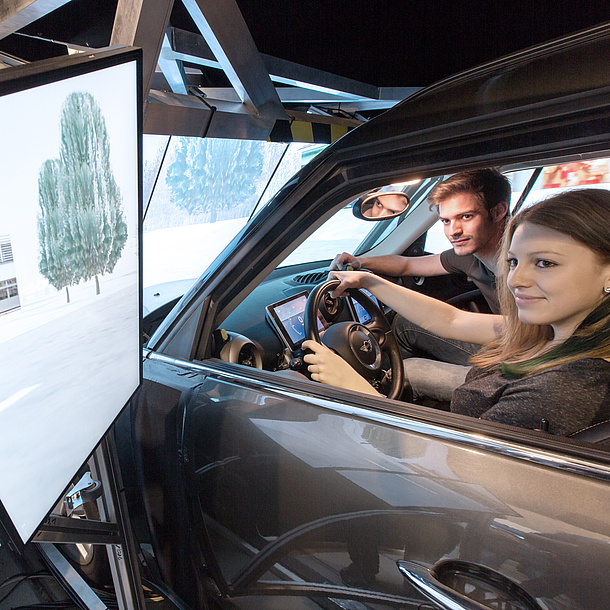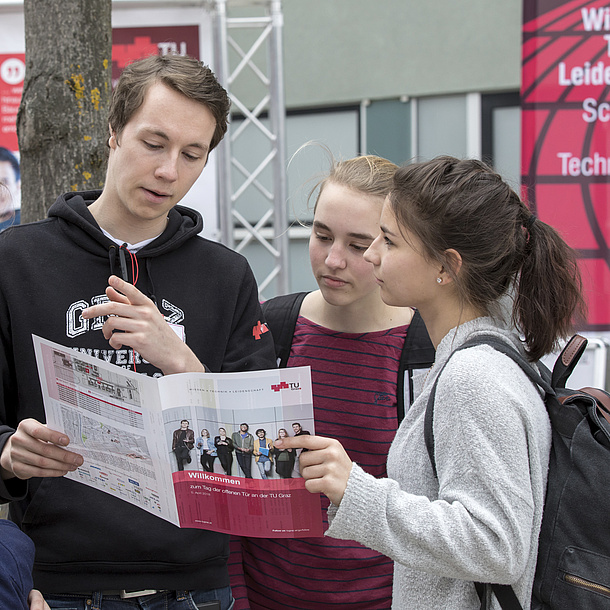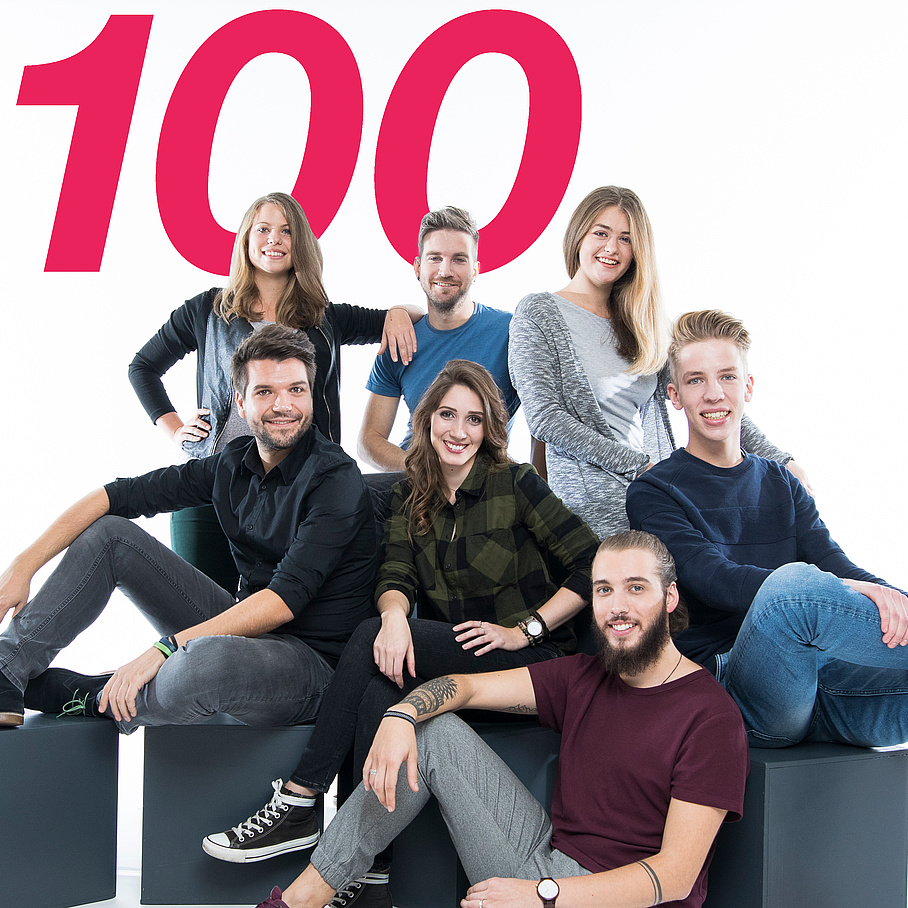Quick Facts
- Duration of study: 6 semesters
- ECTS credit points: 180
- Academic degree: Bachelor of Science (BSc)
- Language of instruction: German
The Bachelor's Programme
In the Bachelor's Degree Programme Mechanical Engineering, you will learn more about innovative technologies in production, materials science, design and manufacturing processes. A unique selling point of this programme is the fact that you become familiar with both the basic subjects of thermodynamics, fluid mechanics and machine dynamics, as well as subjects in which you are involved in the design of machines. State-of-the-art simulation methods and computer-aided development methods are also used.
Excellent research infrastructure is available to you during your studies. This includes high-quality engine test benches as well as hydraulic and thermal test facilities for flow studies.
The practical application of theoretical knowledge also plays an important role. Among other things, the intensive networking between the mechanical engineering institutes with leading industrial partners allows you to carry out practical tasks. For this reason, you learn more about basic subjects such as thermodynamics or thermal engineering, but also have the chance to learn about applications of mechanical engineering to everything from the combustion engine to fuel cells and on to refrigeration and air conditioning systems.
Excellent student networking opportunities are available, such as the Mechanical Engineering Drawing Studio, which support the lively exchange of knowledge and give you the necessary "stamina" to take part in this demanding degree programme.
Studying Mechanical Engineering
Focus Areas
You have an opportunity to learn more in the following subject areas:
Mathematics: You learn how to understand and apply the basic principles of engineering mathematics. You learn how to apply differential equations in mechanical engineering as well as the basics of probability theory and application-oriented, computer-aided statistics.
Technical Mechanics: You will become familiar with the fundamentals of statics and dynamics and learn to understand, analyse and calculate the interactions among forces and movements.
Fundamentals of the Natural Sciences: You will learn how to solve physical problems, e.g. by using vectors or differential equations. In addition, you will learn basic chemical concepts.
Fundamentals of Design and Technology: You will become familiar with the fundamentals of engineering geometry, production engineering and materials science. You will learn how to operate and use lathes, drilling and milling machines in a training workshop.
Design Theory: You will explore topics such as machine drawing and machine elements and design individual parts and assemblies with CAD.
Engineering Computer Science: You will learn to solve engineering problems by using IT-based methods.
Theoretical Machine Design: You will gain an overview of the field of thermodynamics, learning basic knowledge and technical applications and acquiring more extensive knowledge of the fundamentals of fluid mechanics and heat transfer, machine dynamics and electrical engineering.
Economic Sciences: You will learn about project management and the fundamentals of business administration and industrial management. You will work in a team and learn how to present results professionally.
Study counselling: Check what you expect!
What will I have to do in the first semesters? How much practice can I expect? And what can I actually do with my degree when I've finished? Check what you expect!
A student and a lecturer will take time for all your questions and you will get to know TU Graz during on-site appointments. Up to 10 persons can participate at each date.
Contact: lse@tugraz.at
Mechanical Engineering in Research and Industry
Plant and mechanical engineering is the sector with the highest turnover in the Austrian economy. This includes high-tech applications and special machines as well as automotive engineering, turbine construction or, for example, conveyor technology.
The incentive for any further development in the field of mechanical engineering is the desire to achieve the sustainable, efficient and environmentally friendly use of energy. This field offers a wide range of applications, both in specialist sectors as well as in traditional mechanical engineering.
In close cooperation with international scientific partners and with industry, a wide range of research projects are carried out, including
- the development of a measuring method that can be used to measure ultrafine pollutant particles
- the creation of a more environmentally friendly and efficient way to move goods,
- increasing the efficiency of diesel engines and the associated reduction of CO2 emissions, or
- the creation of an environmentally friendly naval system with the help of wind- and hydrogen-powered shipping.
Student teams
Numerous student competition and focus teams with a focus placed on mechanical engineering reflect the enthusiasm and innovative spirit of the mechanical engineering students:
Admission
Admission Requirements
Requirements for admission to a bachelor's degree programme at TU Graz
Admission Deadlines
Summer semester 2025
Admission period: 7 January to 5 February 2025
Winter semester 2025/26
Admission period: 7 July to 5 September 2025
Admission Procedure
Supplementary examination
If you are required to take the supplementary examination "Descriptive Geometry" when you are admitted to the Mechanical Engineering programme, you can take it during the bachelor's programme.
Questions about admission?
Contact study@tugraz.at
Perspectives for Graduates
Professional Fields
As a graduate of the Bachelor's Degree Programme Mechanical Engineering, you can deepen your knowledge by entering a more advanced master's degree programme or start your career.
Graduates of all fields of mechanical engineering are in high demand on the job market. The prospects for mechanical engineers are extraordinarily good on the national and international job markets.
In industry and business, for example, you will work in the following areas:
- research and development,
- construction and design, or
- the construction and use of machines, vehicles and plants, e.g. motor vehicles, rail vehicles, machine tools, conveyor systems, pumps, turbines, environmental, air conditioning and refrigeration systems, industrial robots.
As a freelancer, you can pursue a career as an expert witness, a surveyor, or a civil engineer.
In the public sector, you can conduct research and teach, e.g. at universities and universities of applied sciences, or work in public management.
Advanced Master’s Degree Programmes
After completing the bachelor's degree programme, you can enrol in the following master’s degree programmes without further requirements:
- Mechanical Engineering
- Mechanical Engineering and Business Economics
- Production Science and Management
- Advanced Materials Science
- Green Process Engineering
If you are interested in other master’s degree programmes at TU Graz, you can find information about admission on the respective pages for the master’s degree programmes.
In addition, the bachelor's degree offers you the opportunity to apply internationally for master's degree programmes.




